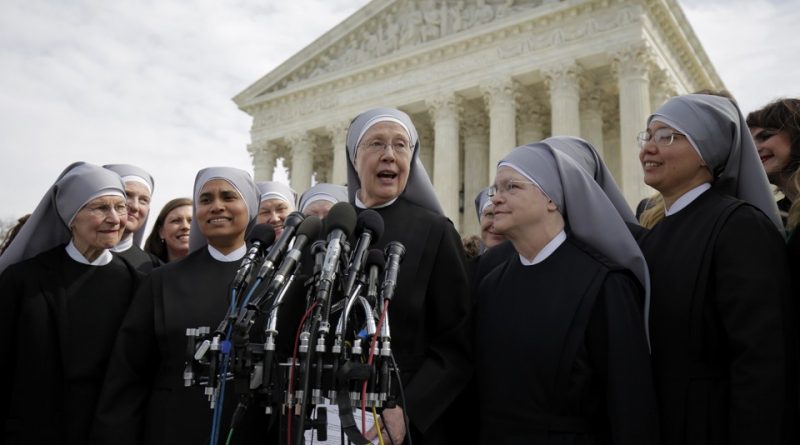Catholic institutions go to Supreme Court over contraceptive insurance coverage
By: Leo Schenk – News Editor
On the May 16, the Supreme Court ruled on the case Zubik v. Burwell, in a way. This case is the most recent challenge to the Affordable Care Act (also known as Obamacare), specifically, the mandate for birth control to be paid for by health care insurance plans.
Brought forth by a Court consolidation of 7 cases from non-church religious organizations, Zubik V. Burwell affects all the religious in the country, including a large amount of Roman Catholics. The Little Sisters of the Poor are a Catholic religious order which runs homes for low-income elderly persons in the United States. Feeling that providing contraceptive coverage in their health plans was against the teachings of the Roman Catholic Church, the Sisters objected to filing the required forms and received an injunction pending resolution of the case.
Their ruling, however, was not precedent setting and did not demand a specific course of action for either the government or for the Zubik plaintiffs. According to Professor Michael McConnell of Stanford in the Washington Post, “The Court vacated the lower court decisions against the religious objectors and remanded the cases to the lower courts”. This unanimous decision thus leaves the government unable to currently tax religious employers for the purpose of providing contraceptive care, however, it isn’t entirely a loss for advocates of women’s health issues. The remanding of the cases to the lower courts functionally means that the Supreme Court will not rule on it right now and is demanding only that the case is sent back to secondary courts with the intent of establishing a compromise.
The Hill describes this as “a victory for both women and religious liberty, and proves as petitioners and their allies have suggested all along, that compromise is possible even on this hot-button issue.” This is most likely based on the example of compromise that the SCOTUS used as an argument against the government’s claim that it was necessary for the religious employers to provide contraceptives. The Washington Post reported the Courts decision. The Plaintiffs and other companies in a similar category would have “no legal obligation to provide such contraceptive coverage, would not pay for such coverage, and would not be required to submit any separate notice.” While there was no binding decision, the Judges confirmed with the government that there was a possibility of insurance companies providing separate plans for contraceptive use which are not paid for by religious employers. This all together means that as the petitioners and the government have agreed that such an alteration of the Affordable Care Act is possible, the court unanimously voted to have that compromise be made and implemented.
Since SCOTUS was able to seemingly begin to resolve this without setting a precedent, there has also been speculation on why that may be, notably, by Trevor Noah on the Daily Show. While not delving too deep into the actual decision, it was brought up that currently, it is actually possible for the Supreme Court to have a tie decision, as there is currently a vacant seat. So it could be that with the next appointee blocked in approval limbo by Congress, the Supreme Court wishes to continue to stay above partisan politics as best as possible by not setting any precedents when a tie is possible to show unity in such a divided time. Regardless of the reasoning, should the compromise take shape, the contraceptive clause of the Affordable Care Act could be saved.

